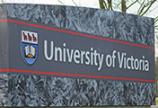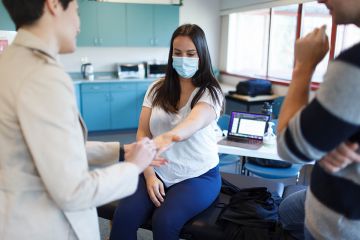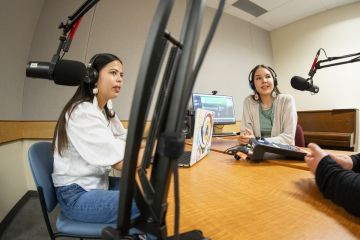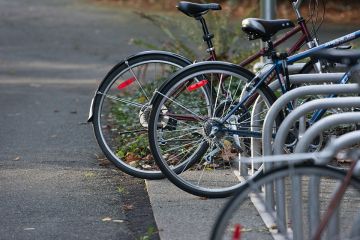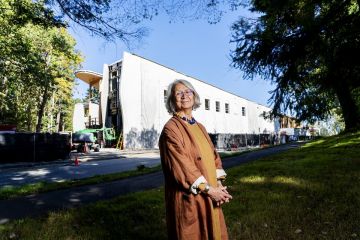UVic makes important changes for student field trips
- University of Victoria
The University of Victoria is making important changes to how it conducts field trips to the Bamfield Marine Sciences Centre (BMSC) following a review of a fatal bus accident last September in which two students, John Geerdes of Iowa City, Iowa, and Emma Machado of Winnipeg, Manitoba, both 18, died. Many other students were injured.
The university, in its commitment to learn from the accident, hired an independent expert to do a review of its planning operations prior to the Sept. 13, 2019 accident, events during the trip as well as the university’s response.
The report identifies several areas where there were gaps or weaknesses and recommends ways to strengthen our approach while also referencing many effective existing policies and procedures, and the hard work of those who responded to the crisis, particularly in the ensuing days and weeks, to meet student needs.
The 43 recommendations cover a range of areas including pre-trip requirements, appropriate transportation and travel on the Bamfield Main road, emergency response protocols and student and family support.
“We know this devastating accident has caused immeasurable grief and that the impacts are ongoing for the families of the students who died, and for the other students on the bus and their families. The university is profoundly sorry,” says UVic president Jamie Cassels.
“We fully accept the review’s recommendations and are already working diligently to implement them to help prevent an accident like this from ever happening again, to improve planning for field trips off campus and to allow us to more effectively respond to critical incidents,” he says. “As leaders, we have learned important lessons that will make our programs and relationships with our community stronger.”
The Bamfield field trip
Established in 1972 on the west coast of Vancouver Island, the BMSC is a unique centre that supports world class research and offers educational opportunities to its five member universities, of which UVic is one, as well as to other schools, institutions and groups. The field studies courses are popular with students for their unparalleled learning environment.
On Sept. 13, a group of 45 first-year students and two teaching assistants for the course who were acting as chaperones, were travelling by chartered bus to the BMSC on a biology field trip.
The bus was mid-way from Port Alberni to Bamfield when it moved closer to the side of the gravel logging road as a vehicle approached from the opposite direction at a point where the road narrows. The bus tipped off the side of the road, slid on its side down an incline and onto its roof.
Emergency responders attended and the students were transported to Port Alberni and Duncan for treatment. Most of the students arrived back at UVic the following day.
The review
Consultant Ross Cloutier, an expert in outdoor-related risk management with Bhudak Consultants Ltd., reviewed university policies, pre-trip information and planning processes, conducted personal interviews with students, their parents, BMSC staff and university employees, and visited the accident site and the Bamfield facility.
All surviving students and their parents or guardians were provided the opportunity to speak or correspond with the consultant, who also travelled to Manitoba and Iowa to speak with the families of the deceased students.
Cloutier had extensive email correspondence with the students and families. Ten students provided input by writing or in person. Personal interviews were held with seven students, the parents of 16 students and with 51 UVic employees.
“We’re grateful to those who contributed to this report through interviews or written submissions including Emma’s and John’s families, the surviving students and their families, and the faculty members, instructors and staff at the university,” says Cassels.
“This was a harrowing event that presented complex challenges and those interviews and conversations would have been difficult. We care deeply about our students. This was devastating for us all.”
Pre-trip activities
Cloutier’s recommendations will help build on UVic’s existing planning to address potential hazards for field trips. Regarding the accident, Cloutier noted that a series of what seemed like non-related and low-consequence events can combine to form a much larger and catastrophic event.
In accepting recommendations related to activities prior to field trips, the university will strengthen pre-planning documents to require a more robust hazard assessment; make emergency contact information a requirement for course registration; review appropriate qualifications and training for trip leaders; and provide travelers with advance comprehensive information on trip logistics and risks.
Future trips to Bamfield
Options for future trips to Bamfield include chartered bus and private ferry service from Port Alberni to Bamfield.
Cloutier described the BMSC as a unique Canadian research facility that offers students a valuable immersive hands-on learning experience in ocean science and coastal ecosystems and its benefit is not in question.
Regarding the central issue of bus transportation, the review says buses for UVic trips can be safely used on the Bamfield road when driven appropriately to road conditions, with driver spatial awareness, during daylight, with care, with enforced travel itineraries and applicable communication and safety technology.
The university is actively working to address the related recommendations.
Safer road travel
Among the changes for any future bus trip to Bamfield are a required hazard assessment and control program for each trip; travel and arrival during daylight; pre-determined itineraries; addition of a satellite phone as well as the satellite communicator device currently carried; first aid and emergency response equipment for the size of group; and trained, appropriate staff on board who can enforce protocols such as adhering to the itinerary and the wearing of seatbelts.
Also, the university will review with the BMSC if a coordinated approach can be developed to benefit all travelers to Bamfield. They will explore the suggestions of a pilot car service, creating and maintaining a website for travelers with road and communication information, and the use of VHF radio vehicle-to-vehicle communications.
These changes are recommended based on current road conditions. Cloutier notes that with appropriate road improvements a number of the above additional measures may not be necessary.
The condition and suitability of the logging road as an essential corridor between Bamfield and Port Alberni continues to be a concern. Of the 85 kilometres, only 10 kilometres are paved.
The university along with the Huu-ay-aht First Nations, BMSC and others are advocating to the BC government for road improvements. Parents of the students have identified this as an important priority.
BMSC is not booking school field trips until at least April 2021 due to COVID-19 health and safety considerations.The university will address all of the pertinent recommendations before using a bus for field trips.
The university agrees with the review that using the MV Frances Barkley ferry may be useful for some field schools.
Response after the accident
The analysis of the university’s response considered the immediate aftermath and the months that followed.
UVic had not experienced a critical incident of this size and severity, nor one with this level of complex consequences and impact.
The recommendations will help the university build on existing well-developed policies and procedures, particularly for off-campus events and large-scale incidents.
Among the recommendations are changes to incident-response decision-making; development of an emergency response procedure for off-campus incidents; further coordination of student service supports on a case-management system; and operational guidelines for the level, volume and complexity of resources to respond to incidents of this scale.
Multiple teams helped provide students with supports of various kinds to work through the accident’s impact including trauma, group and personal counselling; health services; academic accommodation for courses; support within residence; and referrals to external agencies as needed.
At the same time, the families themselves had many questions and needs they wanted the university to address.
“We have listened to the parents about how we can do better, and that they needed to hear directly from senior leadership earlier and more often. We regret that the sorrow, compassion and empathy that we felt was not communicated well to parents and that the approaches we used did not resonate. This review provides us important learnings that will benefit future students through strengthened policies and procedures and approaches to incidents in the future should they occur,” says Cassels.
Photos
In this story
Keywords: administrative, biology, Bamfield

